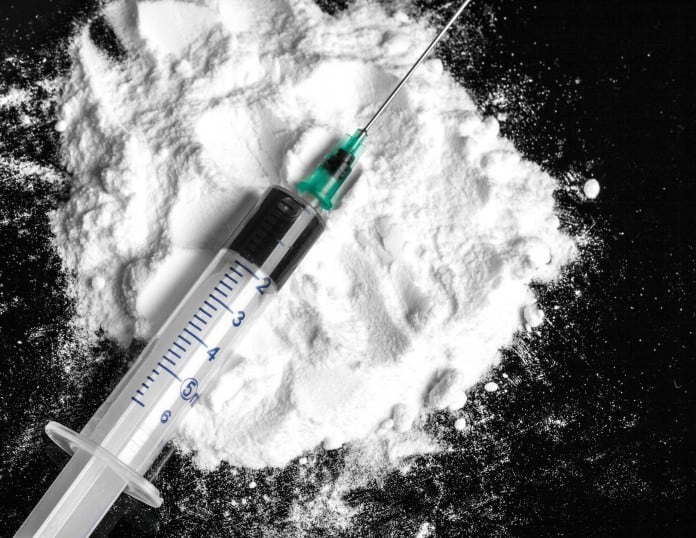
JACKSON – The opiate epidemic is being fought on a number of fronts, but the war is far from over, Ocean County Prosecutor Joseph Coronato said.
Coronato was speaking to a group at the Jackson United Methodist Church about the opiate epidemic in the county. About 50 people were in attendance, and some of them were in the addiction recovery field.
He said the main focus was on education, enforcement, and treatment, and said he is still looking for ideas on how to combat this menace.
Coronato said that when he became prosecutor in 2013, there were 10 overdoses in 7 days. One, was an 18-year-old girl in Brick who was doing 25 packets of heroin in the morning and another 25 at night. This was just the start of how bad the epidemic would become.

People at the presentation were informed what heroin looks like and how it affects the body. It comes in small, plastic bags. The writing on the bag usually has some kind of stylish name, which changes all the time. This is a marketing tool used by the dealers, he said. Ten of these packs make up a bundle. Five bundles equal a brick.
Addicts go to real estate open houses, and ask to use the bathroom. While in there, they rifle through the medicine cabinet for anything they can take or sell. They could go to several open houses a day.
There are also a lot of shoplifting that fuels the drug trade. People steal from one store, and return it to another. They get a gift card, because they don’t have a receipt. Then, they sell the gift cards at a discount to pawn shops.
He also explained what an addict feels like: “You get sick when you don’t have that drug in you. It’s like the flu. Imagine if you had the flu and you knew that if you took something, within five minutes, you’d feel better,” he said.
Drug Education

Drug education is starting in the schools, and police are providing tools to teachers, he said.
One educational tactic is the Right Turn videos that are available to schools. Produced with money taken from drug dealers, they are filmed locally with high school theater classes. They open up with a brief message from a local person turned celebrity. In the video he showed to participants, this was Richie Sambora, guitarist for Bon Jovi. The video took place in Point Pleasant, and showed a series of vignettes. Each one gave a young person a choice. The video then showed the outcome of either choice. One video shows a kid who becomes a drug dealer just by swiping a prescription bottle from his parents. “It was scary easy,” the kid narrated. Another shows a girl getting hooked on painkillers, going through rehab, but then starting up later. There were certain lies that users wind up stating: “I’m just going to try this,” is a lie because addicts lose control. “I’m never going to use a needle” becomes a lie when addicts will try to get drugs any way they can.
Coronato explained that the drugs on the street now are much more powerful than they had been. Additionally, mixed with the pain killer fentanyl, the high lasts longer. It could be 1,000 times more powerful than morphine.
Of the overdoses recorded in the county, 10 percent of them had fentanyl involved in 2014. In 2015, this had risen to 30 percent. Last year, fentanyl was part of 65 percent of overdoses.
That is one of the reasons the prosecutor’s office is trying to get a law passed that if Narcan is administered, then the patient must go to the hospital. In a lot of cases, first responders see that the patient has recovered, and leave them in the house. There is no safeguard that the patient won’t overdose as soon as the first responder leaves. And if fentanyl is in their system, the heroin could stay in their body longer than the Narcan. In this case, Narcan doesn’t stop the overdose, but just delay it.
Narcan, the trade name for naloxone, works by covering receptors in your brain. By covering those receptors, opiates can’t attach to them.
Enforcement

It is not surprising that police departments are going after drug dealers, but the way they are going about it was explained.
Upon overdose, detectives investigate to determine who the victim’s dealer was. Then, that dealer is charged with that person’s death. Doing this, the county tried 31 people for homicide, with another four cases pending in 2017, Coronato said. This is not a new law in New Jersey, but few know about it. It is called strict liability, and it applies to any death in which there was no actual negligence or intent to do harm.
The county has an aggressive forfeiture policy. When a dealer is charged, the county takes their vehicles, house, and other things that might have been bought with drug money. They liquidate those assets and then use that money in the fight against drugs, he said. That money funds educational videos, treatment for addicts, and Narcan, the chemical that saves the lives of people who might have overdosed otherwise.
“What better thing to do than to take drug money and use it to save lives?”
Treatment
None of this matters, he said, if people continue to be addicted. The latest tool in fighting addiction is the Heroin Addiction Recovery Program.
HARP allows users to turn themselves in, and hand over any drugs they have, without any threat of charges or jail. Instead, they are brought to a treatment center for addiction. There have been 54 people helped in this way in the first four weeks, he said.
HARP is a pilot program in New Jersey. For now, it is only available for one day in Manchester and one day in Brick. Coronato said his vision is to expand it to Stafford and Little Egg Harbor first, and then probably Jackson and Lacey.
Even though the program is only for certain days, the police are not turning anyone away, he said. It has just made for a learning curve as people come in. For example, if someone comes in at 1 a.m., there has to be a plan in place for them to get the help they need. If someone comes in with outstanding warrants that are not drug related, they have to figure out what to do about them. If someone comes in who is a sex offender, they can’t be placed in residential facilities. A sizeable percentage have mental health issues on top of addiction. People are coming to Manchester and Brick from Cape May and Gloucester counties. “There was a bus that wanted to come from New York,” he said. There are only so many beds available.
After rehab, support services have to continue, he said. Just because someone is clean, it doesn’t mean their struggles are over. They can relapse. And when they do, they might go back to the same level of drug use they used to have, only without the resistance they had built up. That could be deadly.
Challenges to Come
Education, enforcement, and treatment are turning up success stories, but more needs to be done, he said.
“It’s been spiraling out of control and that’s because we haven’t handled it correctly,” he said.
The prosecutor’s office will be looking at old cases to find out why Ocean County’s death statistics are so much higher than other counties.
There was one speaker who came on before Coronato. It was Dan Schafer, the chaplain for several departments, including Jackson, Brick, Stafford and the Sheriff’s Department.
“In Jackson alone, there have been over 60 death notifications” regarding drug overdoses, he said. Every other day, he hears on the police scanner “unconscious, non-breather.” Two days before the speech, on February 17, someone was found in the Dunkin Donuts parking lot, an apparent overdose.
“It’s the worst news you could ever hear. Someone comes to your door and says ‘I’m sorry to tell you your son was found dead,’“ he said. On an almost bi-weekly basis, officers are going out to tell people this news. “Folks, I’m tired, and our communities and our nation is tired,” he said.






